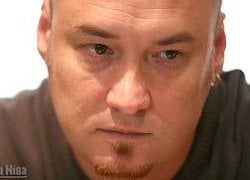Valiantsin Stefanovich: Authorities fear protests in election year
4- 4.12.2014, 16:38
- 12,511

Mikalai Dziadok's prison term may be extended out of fear that he can organise protest actions.
The political prisoner has faced a new provocation. The prison term for Mikalai Dziadok may be extended for a year. A new criminal case was opened against him for numerous violations of prison rules and failure to obey prison officers. His cas can be heard at an on-site court session in the correctional facility. Charter97.org asks Valiantsin Stefanovich, the deputy head of Viasna human rights centre, what does it mean and if these measures are legal.
– What is an on-site court session?
– It is what raises our concerns. We do not now how an on-site court session will be organised. If we recall the similar case of Zmitser Dashkeivch, who was also charged with violating article 411, the trial was held in prison behind doors. Only direct participants – Zmitser, his lawyer, witnesses, the prosecutor and so on – were allowed to be present at the trial. Other people, human rights defenders and representatives of diplomatic missions didn't have an opportunity to attend the trial. We fear that if Dziadok is tried, the trial will be held behind closed doors.
– Why is it dangerous?
– We won't have opportunities to learn all details. I'd like to note that article 411 punishes for systematic violations of prison rules. It punished for an inmate's previous punishments. They count all sanctions that the inmate had during a period of a year or two and punish him again.
– What can you say about the legality of on-site court sessions in such cases as with Mikalai Dziadok?
– On-site court sessions are legal. Sometimes they are held in correctional facilities to improve discipline. Sometimes they are held for security reasons, like in the case with Morozov's gang. It's the other matter that is important. We have a clearly political case with political context. Of course, we demand criminal prosecution of Dziadok, let alone open or closed trials, be stopped. The prosecution should be stopped and he should be released due to the expiration of his term, which already expired in March. He should have been released already.
– Why are the prison authorities so strict to him?
– I don't know the details, but I can conclude that Dziadok has several disciplinary sanctions, and the media reported about it. He was thrown to a punishment cell several times allegedly for violations of prison rules. We see a trend after December 19 that prison authorities press on prisoners, both directly and through other inmates. These are new trends that appeared after 2010. We saw occasional cases before, but political prisoners used to serve their terms without big problems. Pressure has become a routine.
– Why do the authorities increase pressure on political prisoners? They are already in prison. Why cannot they be left alone?
– They do it to break people, to make them fear repressions and criminal prosecution. As far as I know, they don't make people apply for a pardon any more. What about this particular case with Dziadok, I think the “elections” that we have next year is also a reason. They authorities seem to regard him as a dangerous person able to organise protests. I'd like to emphasise again that article 411 is what we have from the Soviet Union. Neither Ukraine nor Russia have it. It is widely used in Belarus, not only against political prisoners. It can always be applied to those who create problems for prison authorities.
– Can we help Mikalai Dziadok so that he can avoid an additional term?
– Human rights defenders cannot help him at this stage. We do what we can, but it's not enough. The international community should assess the situation in our country and demand the release of political prisoners. I mean the EU institutions first of all. We are writing and talking about it, but we have begun to hear about “warmer relations” between the regime and the EU, about the “liberalisation”. Perhaps, relations between our diplomats and EU representatives have become warmer, but we observe a reverse process inside Belarus. The deportation of Elena Tonkacheva from Belarus for an absurd reason, a criminal case against Yury Rubtsou, a criminal case against Mikalai Dziadok... It doesn't show any positive changes, on the contrary, it demonstrates the deterioration of the human rights situation. I don't mention the general situation of public and political rights in the country. It doesn't change at all.
Mikalai Dziadok, Ihar Alinevich and Aliaksandr Frantskevich were tried in the Zavadski district court in Minsk on May 27, 2011. They were found guilty of violating part 2 of article 339 (hooliganism) and part 2 of article 218 (intentional destruction of or damage to property). They were also charged with carrying out attacks and arson attacks on buildings, in particular, holding an unsanctioned antiwar rally near the Ministry of Defence in 2009, throwing Molotov cocktails at the Russian embassy in Minsk and the detention facility in 2010.
Human rights defenders say the sentence to Mikalai Dziadok and other people involved in the case was politically motivated and call Mikalai Dziadok a political prisoner.









